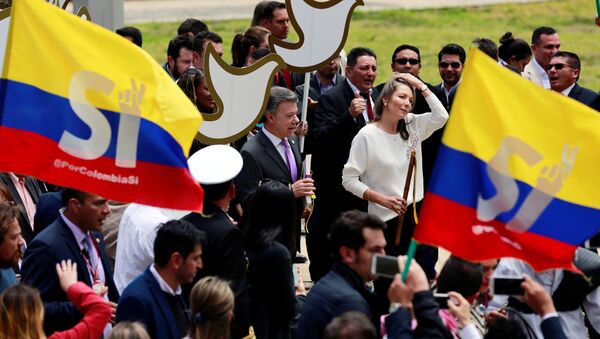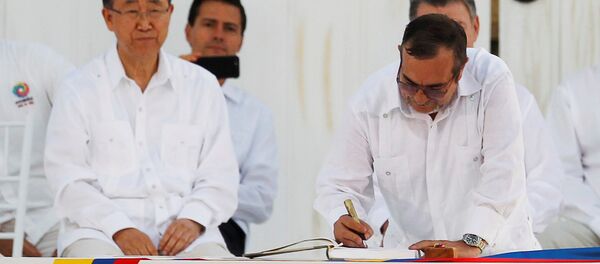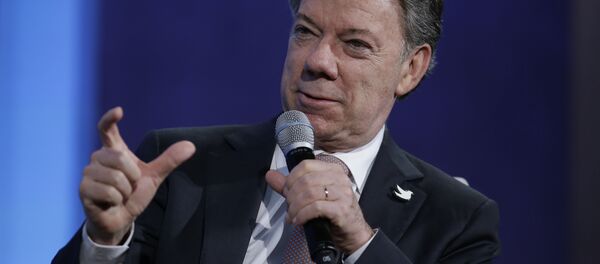Jungle war
Fifty-two years ago Pedro Antonio Marin, a hard-bitten Colombian peasant-turned-guerilla put together a small guerrilla outfit which went on to become South America’s largest rebel group, known as the Revolutionary Armed Forces of Colombia (FARC).
Marin, who also went by the aliases Manuel Marulanda and "Sureshot,” led FARC until his death in 2008.
The $5 million bounty put on his head by the US was never paid.
The FARC hoped a peasant war would eventually lead to a socialist revolution. The guerrillas ambushed local policemen and soldiers, killed and drove out government officials and rich landowners, distributing their plantations to local peasants. During the 1970s the FARC controlled half of the country and was even on the verge of assaulting the capital Bogota.
Narcoguerrilla
By the early 1980s Colombia had become a world leader in the production and sale of cocaine.
Initially, the FARC rejected any involvement in the emerging phenomenon of drug growing and trafficking, but during the 1980s the group gradually came to accept it as it became a burgeoning business.
Taxes on drug producers and traffickers were introduced as a source of funding in the form of a so-called "revolutionary tax” on growers and big land owners.
The latter responded by hiring so-called “death squadrons” who took on the FARC and rival guerrillas and often joined forces with the government against both.
Submachineguns vs drones
Why did the FARC guerrillas who had previously won victories against the army and the paramilitaries, eventually agree to start peace talks with the government?
In 2002 Álvaro Uribe Vélez, the son of a slain land owner and drug baron, came to power on a promise to flush out the guerrillas. Meanwhile, Washington was pouring money and sending armed military instructors into Colombia in a bid to stem the rising tide of illegal drugs entering the United States from the south.
In his crackdown on the FARC Uribe staked on operations by small commando units, helicopter raids and chemicals used to destroy coca plantations.
Faced with a 21st century armed force decimating its units one by one, the FARC was quickly losing ground, though not the war itself. Heavily armed and better organized as they were, government forces still failed to win a decisive victory against the guerrillas.
“The decision to start peace talks with the guerrillas came under strong pressure from Washington, who the Colombian government always listens to,” Moscow-based journalist Oleg Yasinsky told Lenta.ru.
“There were two reasons for this: first, transnational companies needed to snap up the country’s natural resources that remained under guerrilla control. Second, the planned invasion of Venezuela was to come from densely-forested areas on the Colombian-Venezuelan border."
Overkill
The capital Bogota and the majority of provinces that had been hard hit by the conflict backed the peace deal, while those who voted against live in big cities untouched by the conflict and have only seen the war on television.
Ex-President Alvaro Uribe had launched a vicious campaign against the deal. Many blame the referendum’s failure on the government which, seeking public support, spent years demonizing the guerrillas and insisting that there was no alternative to a military solution of the conflict.
In limbo
The rejection of the peace plan has pushed the situation into a deadlock.
The FARC guerillas see no alternative to peace as they have already provided the government with the complete lists of their members, agents and supporters. Many of their units have already come out of the jungle and laid down their arms. The failure of the peace deal turns them into sitting ducks for the army and the “death squadrons.”
The “no” vote is also dashing the government’s hopes of similar accords with other rebel groups. Fully aware of the consequences, Santo and Timoshenko are making every effort to keep the peace accords alive and will soon be meeting again in Cuba.
Unfazed by the outcome of Sunday’s vote, Rodrigo Echeverri has reiterated his “desire for peace and readiness to use discourse as a constructive weapon.”
Time will show how peace with the FARC will come about.




